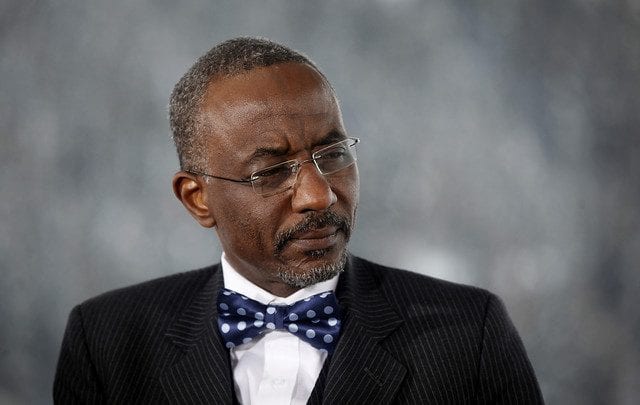
A Federal High Court, Abuja, on Thursday fixed Nov. 30 for judgment in a suit filed by deposed Emir Sanusi Lamido Sanusi II against the Kano State government and others over alleged violation of his rights.
POLITICS NIGERIA learned that Justice Anwuli Chikere fixed the date after counsel to parties in the matter adopted all their processes and final argument taken.
The deposed emir had, on March 12, 2020, sued the Inspector-General (I-G) of Police and Director-General, Department of State Services (DSS) over what he called “unlawful detention/confinement” at the Federal High Court, Abuja.
Also joined in the motion with suit number: FHC/ABJ/CS/357/2020 are the Attorney-General of Kano State and Attorney General of the Federation as 3rd and 4th respondents respectively.
The former emir had, in a motion -ex-parte dated March 12 by his team of lawyers, sought an interim order of the court releasing him from the detention and/or confinement of the respondents and restoring his right to human dignity, personal liberty.
Sanusi, after his banishment from Kano, was confined to Awe town, Nasarawa State. The presiding judge, Justice Anwuli Chikere, however. ordered his immediate release.
Although the deposed emir had since been released after the court ruling, the case is still in court as the originating motion was yet to be determined by the court.
Sanusi’s counsel, Abubakar Mamoud, SAN, told the court that the case was not a chieftaincy matter, because his client was not challenging his deposition.
Mamoud said his client’s complaint was about the alleged violation of his fundamental rights in relation to the manner he was shabbily treated after he was deposed.
“This is not a chieftaincy matter. The applicant (Sanusi) is not challenging the respondents’ action as regard his removal as Emir of Kano, but the way he was bundled to Abuja and banished to a remote location,” Mahmoud said.
He added that it is not in doubt that Sanusi, as a prominent citizen of this country, was shabbily treated in the manner he was bundled to Abuja and subsequently banished to a remote location.
Mamoud faulted the respondents’ applications, challenging the Abuja court’s jurisdiction to hear the case.
He argued that no law support the position that where rights violation occur across several jurisdictions, one cannot approach a court in any of the jurisdictions.
He stated further that it was clear from the way his client was treated that his rights were violated, and as such, he was entitled to seek protection from the court.
Mahmoud urged the court to grant all the reliefs sought by the ex-Emir in his suit. Responding, lawyer to the I-G, Victor Okoye, corroborated Mahmoud’s submission.
He faulted the competence of the suit and queried the court’s jurisdiction to hear it. Okoye, in challenging the jurisdiction of the court, noted that the instrument conveying the ex-Emir’s banishment was authored and endorsed by an official of the Kano State Government in the state.
He argued that the appropriate venue for Sanusi to seek redress for the alleged violation of his rights was a court in Kano State. Okoye urged the court to either strike the case out or dismiss it.
Lawyer to the DG of the DSS, Godwin Agbadua, argued in similar manner and also challenged the court’s jurisdiction.
Agbadua urged the court to strike out the suit on the grounds that the alleged rights violation occurred in Kano, adding that there is a Federal High Court in Kano, before which Sanusi could seek redress.
“Where there are infringement in sequence, the court with jurisdiction is that where the alleged infringement commenced, which by the applicant’s affidavit, is Kano and there is a Federal High Court in Kano,” Agbadua added.
Lawyer to the AG of Kano State, Musa Mohammed, equally faulted the competence of the suit and the jurisdiction of the court in Abuja to hear the case. Mohammed prayed the court to dismiss the suit.

Joyfull